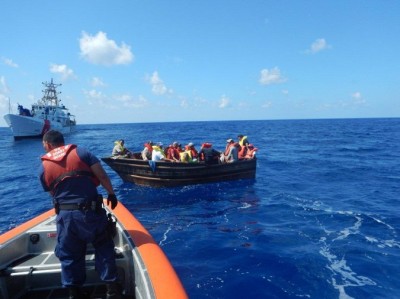Nine Latin American Countries Slam US for Creating Migrant Crisis

The United States’ “wet-foot, dry-foot” rule is prompting a humanitarian crisis, foreign ministers from Ecuador and elsewhere say.
Nine Latin America foreign ministers sent a letter to U.S. Secretary of State John Kerry Monday accusing the United States of fomenting a migration crisis in the region through its Cold War-era immigration policies for Cuban migrants, arguing that President Barack Obama’s failure to change the law despite the recent thaw in relations with his counterpart Raul Castro has adversely impacted the region.
In the letter, the ministers argue that the 1966 U.S. immigration policy toward Cubans known as the Cuban Adjustment Act has “encouraged a disorderly, irregular and unsafe flow of Cubans” through various countries of Latin America on route to the United States and has contributed to a migration and humanitarian crisis in the region.
“Cuban citizens risk their lives, on a daily basis, seeking to reach the United States,” the letter continues. “These people, often facing situations of extreme vulnerability, fall victim to mafias dedicated to people trafficking, sexual exploitation and violence.”
Ecuador and Colombia initially spearheaded the letter, which was signed by seven other countries from South and Central America: Costa Rica, El Salvador, Guatemala, Mexico, Nicaragua, Panama, and Peru.
“The fact that nine foreign ministers have signed this letter shows the strength of the sentiment in Latin America that United States policy is creating a migration crisis in our region,” said Ecuadorean Foreign Minister Guillaume Long in a press conference in Quito Monday. “It’s time for the U.S. to change its outdated immigration policies toward Cubans, because they are undermining regular and safe migration in our continent.”
Long added that the decades-old policy also is a form of “terrible discrimination,” given that scores of migrants from other Latin American countries are forced to “hide and often live decades with the threat of deportation” if they are undocumented, while Cubans are given residence if they step foot on U.S. territory. “This injustice must stop for the wellbeing of all,” he said.
Under the U.S.’s 1966 Cuban Adjustment Act, any Cuban who enters the U.S. is able to gain permanent residency after being present in the U.S. for one year. The act, amended in 1995 to not admit into the U.S. any Cubans found at sea, became known as the “wet-foot, dry-foot” rule.
Critics of the act argue that the rule promotes dangerous forms of travel and provides an incentive for smugglers to turn a profit off migration. The Cuban government has long slammed the policy as a provocation.
Thousands of Cuban migrants, some hoping to reunite with their families, have rushed to take advantage of the policy in the past two years, amid fears that the rekindling of U.S.-Cuba relations could bring an end to the wet-foot, dry-foot rule that allows landed Cuban migrants to stay in the country. Cuban officials have slammed Obama’s inaction on changing the policy, which they say directly contradicts the normalization process.
In recent months, Cuban migrants have increasingly turned to a roundabout route by land through South and Central America, rather than crossing the treacherous sea route from the island to Florida, to reach the United States. But the massive influx of thousands of Cuban migrants to the region has posed serious challenges, and many have been caught in limbo as countries close their borders.
The criticism of the decades-old policy comes after the landmark move in 2015 for the United States and Cuba to normalize ties after more than half a century of frozen relations. The U.S. removed Cuba from its list of state sponsors of terrorism in May 2015, paving the way for Cuba to reopen its embassy in Washington and the U.S. to reopen its embassy in Havana after 54 years. Since then, flights and cruise ships have been able to operate between the two countries, U.S. companies have opened shop in Cuba, and Obama was the first sitting president to visit the island since 1928
While the thaw in U.S.-Cuba relations has been historic, talks are ongoing and diplomatic challenges still remain. Cuba has repeatedly insisted that the U.S. end the economic blockade against the island, return the U.S. naval-occupied territory of Guantanamo, and respect the Cuban sovereignty by halting all funding of anti-government groups.

